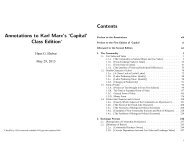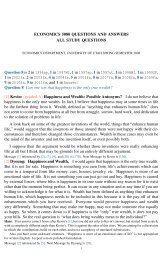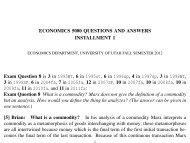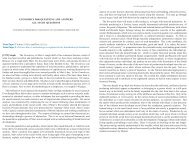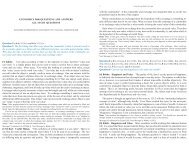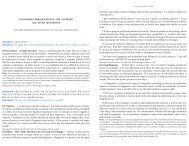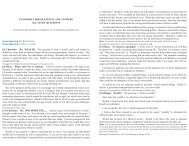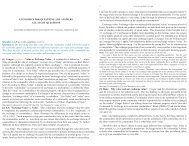Question 1 What did Marx mean with his formu - University of Utah
Question 1 What did Marx mean with his formu - University of Utah
Question 1 What did Marx mean with his formu - University of Utah
Create successful ePaper yourself
Turn your PDF publications into a flip-book with our unique Google optimized e-Paper software.
U <strong>of</strong> <strong>Utah</strong> Econ 5080 2005fa 15<br />
(d) <strong>Marx</strong> does not believe that there is something like human nature.<br />
[725] MK: B<br />
Next Message by MK is [726].<br />
<strong>Question</strong> 27 is 18 in 1995WI, 23 in 1996ut, 20 in 1998WI, and 30 in 2008fa:<br />
<strong>Question</strong> 27 Using modern experience, describe some implications, good or bad, <strong>of</strong> the indifference<br />
<strong>of</strong> market relations towards the nature <strong>of</strong> the needs which the commodity satisfies.<br />
[217] Demosthenes: graded A Indifference Towards Nature <strong>of</strong> Needs. T<strong>his</strong> indifference<br />
leads to the growing inequity that we observe in our capitalist society. I recall a conversation<br />
between two men, one <strong>of</strong> whom was a potato farmer. The farmer could scarcely understand<br />
why he wasn’t a wealthy man. He said, “I am producing something that everyone in the<br />
world can use. I <strong>mean</strong>, everyone’s gotta eat, right?”<br />
The needs for food, water, shelter, air, are the most basic and fundamental that we as<br />
humans would most like to have met from day to day. Why then, would someone who<br />
produces commodities that satisfy these needs, such as t<strong>his</strong> farmer, not be able to exchange<br />
<strong>his</strong> commodity for something else <strong>of</strong> “great value”? T<strong>his</strong> is because market relations, which<br />
determine the exchange value <strong>of</strong> the commodity, are not affected by the needs satisfied by<br />
the commodity. T<strong>his</strong> is why one ticket to a Lakers basketball game can be exchanged for a<br />
room full <strong>of</strong> potatoes. The indifferent market forces <strong>of</strong> supply and demand bestow a higher<br />
exchange value on the basketball ticket, which provides entertainment, than the sack <strong>of</strong><br />
potatoes, which can sustain life. Thus, the basketball star lives a life <strong>of</strong> luxury, comfort, and<br />
excess, while the potato farmer struggles to provide the basic needs for <strong>his</strong> family.<br />
Next Message by Demosthenes is [224].<br />
<strong>Question</strong> 31 is 27 in 1995ut, 29 in 2003fa, 35 in 2007SP, 34 in 2008SP, and 34 in 2008fa:<br />
<strong>Question</strong> 31 Can you think <strong>of</strong> an example in which the quantity <strong>of</strong> something affects its<br />
quality, for instance some physical matter two litres <strong>of</strong> which are qualitatively different from<br />
one litre <strong>of</strong> it?<br />
[39] Ace: graded A– I think one <strong>of</strong> the best examples <strong>of</strong> t<strong>his</strong> principle is when you are<br />
dealing <strong>with</strong> water and steam. Hegel uses the very definition <strong>of</strong> qualities that express my<br />
ideas when he says, “Qualities are those properties which define the thing” (Heg69, p.185).<br />
Some <strong>of</strong> the properties <strong>of</strong> water at room temperature compared to steam at 100 degrees<br />
Celsius are as follows.<br />
Water is not able to be condensed to a smaller more confined area, whereas steam will<br />
allow pressure to be placed upon it and can be condensed. The volume <strong>of</strong> water and steam<br />
changes, one cubic foot <strong>of</strong> steam condenses to 1/8 <strong>of</strong> a cup <strong>of</strong> water. T<strong>his</strong> is done by the<br />
molecular movement that changes when water is vaporized to steam. Water is denser than<br />
steam because the molecules are freer to roam when in a liquid or a solid. So when the<br />
quantity <strong>of</strong> heat changes so do the qualities <strong>of</strong> water.<br />
Message [39] referenced by [43]. Next Message by Ace is [242].<br />
[43] Michael: An answer to t<strong>his</strong> question would be an example <strong>of</strong> a physical entity whose<br />
quality (as in: characteristics) depends on its quantity. If I understand Ace [39] correctly,<br />
16 2005fa Econ 5080 U <strong>of</strong> <strong>Utah</strong><br />
Ace’s proposal cannot be an example <strong>of</strong> t<strong>his</strong> because he (say) argues that water changes<br />
qualitatively as different amounts <strong>of</strong> heat are applied to it. In t<strong>his</strong> case, it is not in different<br />
amounts <strong>of</strong> water that we find different qualities but rather it is the amount <strong>of</strong> heat that is<br />
changing. Do you sense the problem?<br />
Consider what <strong>Marx</strong> says in the first paragraph, section 2, part a: “It is apt to be forgotten<br />
that the magnitudes <strong>of</strong> different things can be compared quantitatively, only when those<br />
magnitudes are expressed in the same unit. It is only as expressions <strong>of</strong> such a unit that<br />
they are <strong>of</strong> the same denomination, and therefore commensurable.” So the problem is t<strong>his</strong>:<br />
Suppose that in different amounts <strong>of</strong> water, water is qualitatively different. Then ask: are we<br />
in that case even comparing two different quantities <strong>of</strong> the same thing (water)?<br />
Another issue is whether in t<strong>his</strong> example it is even the quantity <strong>of</strong> water that is changing<br />
(regardless <strong>of</strong> why). It seems that rather than the quantity <strong>of</strong> water changing, it is the volume<br />
<strong>of</strong> the space that contains it. After all, the number <strong>of</strong> H2O molecules has not changed, they<br />
are only more densely located in the case <strong>of</strong> solid water (compared to steam). I hope t<strong>his</strong> is<br />
found useful.<br />
Next Message by Michael is [55].<br />
[46] Hans: The example I was thinking about is enriched Uranium, which is a radioactive<br />
yet stable metal in small quantities, but explodes when it is present in larger quantities.<br />
Such critical mass considerations can probably also help explain the character <strong>of</strong> popular<br />
movements and uprisings, which are notoriously difficult to predict. Some people are always<br />
dissatisfied, but if the percentage <strong>of</strong> dissatisfied people gets beyond a critical point, then they<br />
reinforce each other and t<strong>his</strong> can lead to powerful mass movements.<br />
<strong>Marx</strong> predicted capitalism to approach such critical mass because a larger and larger<br />
fraction <strong>of</strong> the population is hurled into the working class. He said somewhere that the only<br />
weapon <strong>of</strong> the working class is their numbers.<br />
Next Message by Hans is [60].<br />
<strong>Question</strong> 35 is 37 in 2008fa and 39 in 2012fa:<br />
<strong>Question</strong> 35 <strong>What</strong> is the <strong>mean</strong>ing <strong>of</strong> “natural” in the term “natural worth”?<br />
[65] Gza: (graded A) Natural worth. I was wondering if anyone can help me understand<br />
<strong>Marx</strong>’s definition or understanding <strong>of</strong> “natural”. I know that there is some connotation to<br />
Locke’s definition but does <strong>Marx</strong> draw a distinction between “natural worth” which he says<br />
is to supply the necessities <strong>of</strong> life and what is “natural”? In other words is the “natural” in<br />
the term “natural worth” different from the definition <strong>of</strong> “natural” attached to some worth<br />
other than the “worth” in “natural worth”? I just find the term “natural” troubling because<br />
<strong>his</strong>torically the idea <strong>of</strong> nature and what is natural has changed so much and even <strong>with</strong>in a<br />
context the term seems abstract and elusive, let alone attaching it to “worth”. In other words,<br />
1. does “natural” have a distinct <strong>mean</strong>ing for <strong>Marx</strong> in <strong>his</strong> term “natural worth”<br />
2. if it does how does <strong>Marx</strong> define “natural”<br />
3. if “natural worth” cannot be dissected into two words that will maintain <strong>his</strong> idea, isn’t<br />
“natural worth” a social phenomenon that does not preexist society?



